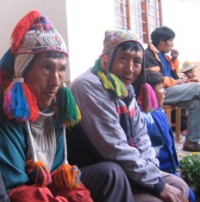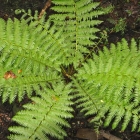Peru Mapacho River Watershed Environmental Capacity Development Project
Completion Date: Jun 30, 2009
- Asociación Para La Conservación de la Cuenca Amazónica (ACCA)
- Greenheart Conservation Company
- Canadian International Development Agency (CIDA) Voluntary Sector Fund
See a HD video of this project.
This project will develop the capacity of the Asociación Para La Conservación de la Cuenca Amazónica (ACCA) and five communities in and around Juan Velasco Alvaredo de Sunchubamba to diversify their local economy and capitalize on local eco-tourism developments, including a Canadian built canopy walkway. The project will concentrate on the interface between environmental sustainability and human well-being within the context of the Millennium Development Goals in the Madre de Diós basin in southern Peru. Located near the international tourism hotspots of Cusco and Machu Pichu and adjacent to the UNESCO Manu Biosphere Reserve, this area is considered by some to be the single most important biodiversity conservation area in the world! It is also one of the poorest regions in Peru. It spans multiple ecological zones making it an important repository in terms of climate change adaptation. It is also a place of very high cultural diversity. There is documented evidence of “pre contact” human populations still living amidst its vulnerable forested ecosystem where an enormous diversity of plant and animal life survives.

The project communities lie within an important economic multiple use zone in the Rio K’eros region. Based on the successful development of ecotourism and canopy walkway activities in other tropical forests environs and the establishment of Conservation Concessions, the ACCA, in cooperation with the Canadian Greenheart Conservation Company (Greenheart), is developing a $1.2 M eco-tourism facility in a phased development. Major partners in the project, to date, include National Geographic Society, Moore Foundation, Alcan Primary Metals Canada and Verde Ventures (a green bank venture of Conservation International). The walkway will be aimed at tourists who currently use the Cuzco-Pilcopata road to access the lowland portions of Manu National Park. ACCA has completed a business plan that confirms the financial viability of this canopy walkway which, based on conservative estimates, predicts average annual revenues of $100,000 per year. Canopy walkways have proven to help preserve ecological integrity while also developing local economies as an economic alternative to deforestation.
The project will mitigate the threats to biodiversity via six sets of project activities: 1) community economic development (CED) based on ecotourism and natural resource management; 2) policy dialogues; 3) leadership development; 4) gender mainstreaming; 5) eco-tourism guide training and environmental education curriculum; and 6) public engagement in Canada and Peru (see table below). These activities will include training in natural resource management and conservation to local groups (Q’eros indigenous populations in particular); engaging in gender sensitive guide training and gender mainstreaming activities that focus on rural poor and women, assisting 5 communities in the technical and legal aspects of natural resource management; supporting the design and implementation of reforestation, rangeland and camelid management plans, forest management plans, business plans for traditional textile products and “aguaje” (Mauritia Flexuosa) fruit management plans; environmental education through local promoters; qualitative and organizational analysis studies on conservation and natural resource management practices; providing technical assistance to local organizations in natural resource management; capacity building initiatives that focus on empowerment and leadership; and promoting community participation in local and inter-institutional events to facilitate policy dialogue and agreements on conservation initiatives.
Policy dialogue activities are particularly important because governance of natural resources is central to the sustainability of the region. Workshops and training will be focused on improving the capacity of the ACCA and local authorities to dialogue on policy interventions regarding ecological governance. Watershed, agriculture, forestry, land degradation and biodiversity as well as climate change will be the subject of dialogue forums, workshops and educational efforts.
This project will be based on the successful model of community based natural resource management that One Sky has been doing in Nigeria, West Africa in cooperation with Greenheart and local NGOs to develop successful models of sustainable livelihoods, including the completion of Africa’s longest and most sophisticated canopy walkway. The project builds on the successful approach used in Nigerian forest communities, by using an “integrally informed” methodology for certain elements of programming. This will be done, specifically, by focusing on both the external factors of economic development as well as institutional and personal leadership development. An integral framework was used by UNDP HIV/AIDS Group’s Leadership for Results Programme in over 30 countries, is documented in Mainstreaming HIV and AIDS in Sectors & Programmes. An Implementation Guide for National Responses (World Bank, UNDP and UNAIDS, pp. 105-112), and also reported on in CCIC Au Courant (Fall 2005, number 2, p 6-9). The Millennium Assessment report “Ecosystems and Human Well Being” (chapter 5) underlines the critical need for integrated approaches in international development. This project will use this innovative methodology in a similar way as UNDP, but oriented towards leadership development and capacity building for environmental conservation and sustainable livelihoods for the rural poor.
One Sky will work directly with the ACCA and Greenheart to develop a local CED plan, in the first year that will incorporate an ecotourism development component. As part of the planning process, gender specific activities will be identified based on sex-disaggregated data so that gender mainstreaming within the ACCA and local communities can be implemented at a policy level by year two. A leadership program to develop local committee capacity on ecological governance will be the focus of the second year of activities along with a gender sensitive guide-training program. An environmental education curriculum will be developed in the second year of the project in order to develop local understanding of the links between the Millennium Development Goals, including halving the number of poor people globally by 2015, and Multilateral Environmental Agreements regarding climate change and biodiversity. Throughout the project One Sky will engage the ACCA in developing their RBM and financial management capacity based on a successful organizational development model supported by CIDA in Nigeria (Cross River Environmental Capacity Building Project – Nigeria).
The project activities will result in a self-financed and economically independent NGO that will gain part or all of its revenues from local ecotourism and alternative livelihood activities including textile development for local tourism markets, the production of Inca Inchi (Plukenetia volubilis Linneo) which is high in amino acids, vitamins A and E and Forest Stewardship Council certified Brazil Nut production. The canopy walkway concept is based on an approach developed by Greenheart and proven at a number of locations such as Iwokrama Guyana, Atlantic Rainforest in Brazil, and Columbia State University in the U.S. One successful example of this is Kakum National Park in Ghana where the revenue from the Kakum Park canopy walkway (also built by Greenheart) pays for local conservation efforts and brings in over $1M/yr and up to 800 visitors/day and 80,000/yr. Public engagement activities in Canada will focus on successful models in private sector/civil society partnerships regarding sustainable development ecotourism and lessons learned from the South. By marrying the economic development skills of private sector companies (Greenheart) and international investors (Alcan), with the local community development skills of NGOs such as the ACCA and One Sky this project is designed to evolve into a Type II partnership (WSSD) with government and local authorities that will benefit the rural poor.

